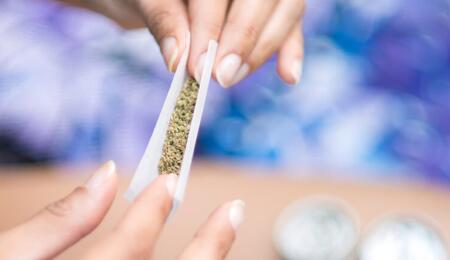Zombie Weed

Is Feminization Threatening the Integrity of our Genetics?
Is Feminization Threatening the Integrity of our Genetics? Hailed by some as the industry's best innovation, by others as a scourge to the preservation of true Cannabis genetics, feminized seeds have been surrounded by controversy since their introduction into the mainstream. SSUSA attempted to find out how the insiders - the people who now must produce these seeds in order to compete - feel about the oft-maligned alternative genetics.
If you want to run a successful business, you must compete. In order to do so, professional business owners should be constantly aware of changes in the market and to what extent they are being topped in their field. Owning a Cannabis seed label is no exception - especially now, considering the industrialization of the plant in some parts of the western world, plus innovations such as feminization.
Due to the unnatural - that is, straining against the plant's inherent botanic and genetic tendencies - quality of feminized seeds, many experienced growers choose to avoid them, instead purchasing regular genetics. (For the amateurs out there, feminized seeds produce female only plants; regular genetics result in a rough 50/50 ratio of male to female plants.) In addition, the process of feminization usually includes the application of chemicals onto the plants; therefore, many have environmental and health objections to the practice. So how are we to learn anything about it, when the industry surrounding it appears to be one of shame, guilt or secrecy?
Luckily, one company stepped forward and offered to talk with us. Amsterdam-based Devil's Harvest Seed Company, established just over a year ago, have been behind the scenes much longer than in the spotlight. In fact, it was perhaps this wealth of knowledge and experience that makes them such a successful seed label, despite the company's young age. A willingness to share information, coupled with a finesse for heavy-hitting genetics, has made the DHSC rising stars in the Dutch and international ganja game. And none of it would have been possible without feminized seeds.
The DHSC aren't breeders, and they're quite honest about that. "We make crosses; we don't breed strains. We're not breeders - we're just taking today's popular strains and making them into new crosses. That's what sets us apart from other companies." The fact that they were willing to sit with SSUSA and spill their technical secrets also makes them unique. Many seed companies refuse to divulge company information to even their own staff. This should give you an idea of just how lucrative the feminization movement has become.
Popular with "commercial growers, and... more of the young, stoner population," the DHSC is quickly rising in popularity as developers of Amsterdam favorites such as Kuchi, Strawberry Sour Diesel, Dazy Jones and Shoreline, the effect of which the two describe as a "great kick in the head." Despite being experienced growers and preferring regular strains for themselves, the duo became faced with a harsh truth a short time into their professional careers: no seed company would excel without a feminized option - for at least a few varieties.
Luckily, the transition posed few problems. The DHSC were already working to produce S1 seeds, since the original parentage for so many beautiful varieties has been lost. "We're providing Amsterdam coffeeshop genetics, that otherwise aren't in seed form, and we're making them into seeds and making them available for people to gather in libraries - again, preserving Amsterdam genetics; it's more about keeping what's present alive."
We in the industry are lucky enough to still have access to some of these legendary varieties: some have later-generation offspring for which seeds are available; while others are limited to being doled out, a gram at a time, in obscure coffeeshops. The DHSC would hate to see some of these legends disappear, created at a time when the two were just wetting their feet in the industry. This happened to coincide with the birth of female seeds.
They take us back to the awakening of the feminization movement, which occurred from the mid- to late-nineties. "Back then, Dutch Passion were the biggest company that went for it. They used gibberellic acid (which was an old method) and found out how to make feminized seeds, which before were being made by farmers around, roughly, the early 1900s. No one really used it on Cannabis until the present day, when it started becoming so popular and people started becoming hobby growers, demanding less space being wasted and more efficient grows. Feminization became very popular in the mid-nineties, when they realized they could provide that for their customers."
With regard to the public's perception of these newly-debuted Franken-strains, the smokers "just didn't know the difference - in the beginning - but nowadays they realize that when they start smoking seeds in their weed, there's something wrong." The DHSC also remember, wryly, how growers thought that feminization was the "answer to all of their problems," but in reality, "they got more problems than solutions in the end, because it backfired. The primary method of feminizing Cannabis seeds wasn't good.
"Feminization methods originated with gibberellic acid. But then, as the demand further increased, people tried other methods. Nowadays it seems the STS Formula works best for feminization, provided you're using really good genetics that don't have hermaphrodite traits existing in their lineage. So, we're trying to take the strongest female plants that are available in the current market, and we're only feminizing the ones we think are best suited to feminize with. Otherwise, certain flavors that are really popular just can't be feminized because of the onset of troubles you'll get when you grow them out." If only the earliest, intrepid seed labels were aware of this. Perhaps the reason feminized strains have a bad reputation can be traced to those early, gibberellic acid-soaked days. "It became more of a hassle to grow feminized stock than it was the original way - and people forgot how to do it the original way, because feminized [seeds] took over in such a short space of time. So, if anything, it nearly crushed the market."
The worst pitfalls that breeders encounter when feminizing seeds? "Well, firstly, it's the hermaphrodite problem; it's a big issue with them - especially when they pollinate other rooms and pollinate other plants.
"Also, mutated genetics. Not getting what they expect to happen. Freaky plants - that was the biggest problem. With clones, you can be sure that you're getting an identical plant to the original mother; but with feminized seeds, you can never be certain that you're going to get the exact same result each and every time. Problems occur from that, because it's so unpredictable (what can happen with each different strain). Also, with the batches of seeds that are being made by the feminized seed breeders, you don't even know if it's the same person who made this batch, or if it's the same seed batch that was made the previous year."
If the process is difficult for breeders, then the result is devastating for growers. We as growers are limited in our success by the limits of our breeders abilities and knowledge. It is a shame; however, this issue highlights the need for diligence among the Cannabis cultivation community.
Breeders are able to select from several tried methods for feminizing seeds. "It seems that the most popular thing that people are doing is to select only one breed that puts out enough pollen. When people found out that, for example, AK-47 gives out the most pollen, they would use that one plant to breed out all of their feminized seeds. They'd then sell you the seeds as if it were another cross, like Cheese. But that Cheese has been crossed with an AK-47 x Cheese, and they don't tell you that at the seed company. And you don't notice it because you don't expect it or weren't looking for it; whereas we're trying to do it the way you should be doing it.
"Some people who are making them are still using gibberellic acid. There's another way - people are trying a home method, and mixing their own formulas, which aren't really good to be making. You have to get the components from pharmaceutical companies, but you need licenses to purchase them. So, resourcing the formulas can be difficult - that is a flaw of this whole industry, getting the resources to make feminized seeds has proven to be difficult.
"There's another method that I found out about here in Amsterdam, where they'll take a whole room and spray them, and let them trigger and turn into hermaphrodites, and pollinate themselves. They then take all those seeds and sell them as feminized seeds; when this happens people automatically have hermaphrodite problems. The breeder then may also take the weed he produced, bash it up and make it into hash and sell it back to people, but that would be contaminated product. Because of the lack of knowledge on his part (it's not his fault; he's just trying to make money like we all do) he wouldn't know what he was really doing.
"Regarding other methods, people claim to have natural hermaphrodites; I don't believe that that's so. I don't think they'd breed with them in that way."
After all their years of research and observation, the DHSC has settled on the STS Formula. Why? "Because through trial and error, the STS method seems to be the most successful one in the industry, and from talking to many people who make feminized seeds, this method seems to be the favorite of everyone. It seems to be the most reliable; it works, simple as that."
In the Netherlands, at least, it isn't always easy to get a straight answer out of the super-secretive breeders, due to the clandestine nature in which the (legal) seeds are produced. That's right: everything leading up to the sale of the little bubble packs in shops and online is illegal and a punishable offense. Selling the seeds themselves, however, is quite legal if the business is registered and taxes are paid.
For this reason, many new seed companies find it difficult to survive and compete in the Dutch industry, especially with more than one popular process - and little related info - still floating around. "Other people will tell you that they do one thing, and maybe they do, but maybe they don't. There aren't any other methods here, besides STS, that people are using successfully at the moment."
So who benefits from feminized seeds, other than the seller? "For the outdoor growers, they get the benefit of maximized space; for indoor growers, the benefit is not having to keep a collection of mothers and clones, and constant storage. Also, they don't have to maintain a library, which is fucking hard!"
Despite the transparency with which my questions had been answered, their next response was still a little blunt. When asked if there is anyone out there who should not be using feminized genetics, the DHSC openly replied, "Experienced growers shouldn't be using feminized genetics. Anyone who has any experience should know fully about them and why not to use them, and why they aren't good for everyone. The only reason people should be using them, as such, is when good genetics become lost, and you only have the female available - the S1 genetics, they are definitely the good ones to find.
"If you've got experience, you should know not to use them; those are the only people who I think shouldn't. Basic growers can use them; mid-level growers can use them; but, other than that, experienced growers should know better."
It may seem strange to hear this sort of blatant honesty from the people who are trying to sell you feminized seeds, but that wasn't the purpose of this interview. We're not trying to smear the name of feminization, nor are we implying that such a product doesn't have a healthy market and a viable future.
As the DHSC puts it, for the alternative strains, a "lack of consistency, lack of stability of genetics, mutant-ism and hermaphroditism are the major issues - zombie weed! If you do it right, it works; if you do it wrong, it will make everyone else look bad."
S
Soft Secrets



